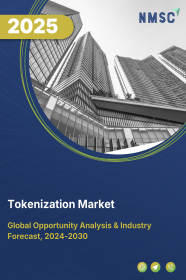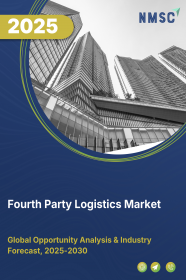
Tokenization Market by Component (Solutions and Services), by Services (Professional Services and Managed Services), by Organization Size (SMEs and Large Enterprises), by Deployment Mode (Cloud and On-Premises), by Tokenization Technique (API-Based and Gateway-Based), by Application (Payment Security, User Authentication, and Compliance Management), and by End User (BFSI, Healthcare, IT & Telecom, Retail & E-Commerce, and Others)- Global Opportunity Analysis and Industry Forecast 2024-2030
US Tariff Impact on Tokenization Market
Trump Tariffs Are Reshaping Global Business
Market Definition
The Tokenization Market size was valued at USD 3.26 billion in 2023 and is predicted to reach USD 11.09 billion by 2030 with a CAGR of 19.1% from 2024-2030. Tokenization is the process of converting sensitive data or assets into a tokenized format, typically in the form of digital tokens, for secure storage, transmission, or usage. These tokens are unique, encrypted representations of the original data or asset, often used in digital transactions to prevent unauthorized access or theft. Tokenization helps enhance security by replacing sensitive information with non-sensitive placeholders, reducing the risk of data breaches or fraud. It is widely used in various industries, including finance, payment processing, and cybersecurity, to protect sensitive information while maintaining usability and functionality.
Market Dynamics and Trends
The demand for tokenization is increasing due to the growing adoption of computerized procedures such as Primary Account Number (PAN) tokenization, credit card tokenization and multi-factor tokenization coupled with the digital processing of all sensitive data for data security service and solutions. Also, the growing number of cyber-attacks and malicious online activities disrupting business operations and personal data thefts is further driving the growth of tokenization market. A staggering 60% of healthcare organizations worldwide fell victim to cyberattacks in 2022, illustrating the heightened vulnerability of the sector to malicious activities.
Within this alarming statistic, ransomware attacks, a particularly insidious form of cyber threat, exhibited an unprecedented level of success. Nearly 75% of ransomware attacks succeeded in encrypting data, marking the highest rate of encryption observed in the past three years. These alarming trends emphasize the urgent need for robust security measures such as tokenization to safeguard sensitive information and mitigate the risks posed by cyber threats.
Moreover, the increasing fraudulent activities in the e-commerce sector along with the growing credit and debit cards fraudulent activities is further fueling the growth of the tokenization market. According to Federal Trade Commission data, consumers reported losing more than USD 5.8 billion to fraud in 2022, an increase of more than 70% from the previous year.
However, the absence of standardized protocols and frameworks for tokenization across different industries and regions can impede interoperability and scalability. This lack of standardization may lead to fragmentation and inefficiencies in the tokenization ecosystem, restricting the expansion of tokenization market. On the other hand, the introduction of web 4.0 technology to create digital tokens that represent ownership in a variety of assets, including real estate, artwork, and other valuable items is expected to create ample growth opportunities in the market.
Market Segmentation and Scope of Study
The global tokenization market is segmented on the basis of component, service, organization size, deployment mode, tokenization technique, application, end user, and geography. Based on component, the market is classified solutions and services. On the basis of service, the market is segmented into professional services and managed services. Based on the organization size, the market is segmented into SMEs and large enterprises. On the basis of deployment mode, the market is categorized into cloud and on-premises. Based on tokenization technique, the market is categorized into API-based and gateway-based. On the basis of application, the market is divided into payment security, user authentication, and compliance management. On the basis of end user, the market is segmented into BFSI, healthcare, IT & telecom, retail & E-commerce, and education. Geographical breakdown and analysis of each of the aforesaid classifications include regions comprising of North America, Europe, Asia-Pacific, and RoW.
Geographical Analysis
North America dominates the global tokenization market and is potently expected to remain dominant throughout the forecast period. This is attributed to the rapid adoption of digital technologies followed by the rising trends of blockchain and cryptocurrency in the region. This adoption fosters an environment conducive to the widespread acceptance and implementation of tokenization solutions across various sectors such as finance, healthcare, retail, real estate, and supply chain management.
Moreover, the presence of key market players such as Visa Inc., Mastercard International Incorporated and American Express Company, that are adopting various strategies such as product launches and acquisitions in the region to expand their market presence is further driving the growth of the tokenization market. For instance, the introduction of Visa's Acceptance Cloud (VAC) platform in January 2022 signifies a concerted effort to enhance the suite of solutions available to clients, thereby strengthening Visa's market position and fostering deeper customer engagement. Similarly, Mastercard's acquisition of CipherTrace in September 2021 underscores a strategic alignment with the burgeoning cryptocurrency landscape, allowing Mastercard to augment its cybersecurity offerings and provide enhanced transparency to enterprises navigating the complexities of digital assets. Such initiatives by industry giants are expected to further propel the growth of the tokenization market in North America.
On the other hand, the growth of the tokenization market in the Asia-Pacific region is driven by the increasing digitalization in countries such as India and South Korea. This digitalization trend fuels demand for tokenization solutions, particularly in addressing the need for secure data storage and processing. The Asia-Pacific region offers ample opportunities for digital transformation. By 2030, Southeast Asia's internet economy is projected to reach USD 1 trillion, according to the World Economic Forum. This growth is fueled by a rapidly expanding base of digital consumers and applications, indicating the region's potential as a significant market for tokenization solutions.
Also, the rising prevalence of digital payments in developing countries is a key driver fueling the growth of the tokenization market in the Asia-Pacific region. Mastercard reports that in 2023, 60% of consumers in the APAC region utilized digital wallets for payments, highlighting a substantial shift towards digital payment methods. Furthermore, the market for digital payments in Asia Pacific is experiencing rapid expansion, with a remarkable 30% annual growth rate. This surge in digital payment adoption underscores the increasing demand for secure and efficient payment solutions, thereby creating favorable conditions for the adoption and growth of tokenization technologies in the region.
Competitive Landscape
The tokenization market includes several market players such as Fiserv, Inc., Visa Inc., Mastercard International Incorporated, American Express Company, THALES, Fidelity National Information Services Inc., Futurex, Cashlink Technologies GmbH, NYALA Digital Assets AG, Bitbond GmbH, Fireblocks LLC, BRICKKEN SOLUTIONS S.L., Vertalo, Inc., Spydra, Antiersolutions. These market players are adopting various strategies such as collaboration to maintain their dominance in the global tokenization market.
For instance, in May 2023, Visa, a prominent card payments company, unveiled a new feature enabling users to conduct online transactions without entering the cardholder verification value (CVV), provided that the card has been tokenized. This innovative CVV-free feature, launched initially in India, aims to streamline the online transaction process, enhancing user convenience and security.
Also, in June 2021, Micro Focus partnered with Amazon Web Services, to provide automate data-centric protection to AWS users, while sticking to data protection and privacy requirements.
Key Benefits
-
The tokenization market report provides the quantitative analysis of the current market and estimations through 2024-2030 that assists in identifying the prevailing market opportunities to capitalize on.
-
The study comprises a deep dive analysis of the tokenization market trend including the current and future trends for depicting the prevalent investment pockets in the market.
-
The information related to key drivers, restraints and opportunities and their impact on the tokenization market is provided in the report.
-
The competitive analysis of the market players along with their market share in the tokenization market
-
The SWOT analysis and Porters Five Forces model is elaborated in the study.
-
Value chain analysis in the market study provides a clear picture of the stakeholders’ roles.
Key Market Segments
By Component
-
Solutions
-
Services
-
Professional Services
-
Managed Services
-
By Organization Size
-
SMEs
-
Large Enterprises
By Deployment Mode
-
Cloud
-
On-Premises
By Tokenization Technique
-
API-Based
-
Gateway-Based
By Application
-
Payment Security
-
User Authentication
-
Compliance Management
By End User
-
BFSI
-
Healthcare
-
IT & Telecom
-
Retail & E-Commerce
-
Energy & Utilities
-
Real Estate
By Region
-
North America
-
The U.S.
-
Canada
-
Mexico
-
-
Europe
-
The U.K.
-
Germany
-
France
-
Italy
-
Spain
-
Denmark
-
Netherlands
-
Finland
-
Sweden
-
Norway
-
Russia
-
Rest of Europe
-
-
Asia-Pacific
-
China
-
Japan
-
India
-
South Korea
-
Australia
-
Indonesia
-
Singapore
-
Taiwan
-
Thailand
-
Rest of Asia-Pacific
-
-
Rest of the World (RoW)
-
Latin America
-
Middle East
-
Africa
-
Key Players
-
Fiserv, Inc.
-
Visa Inc.
-
Mastercard International Incorporated
-
American Express Company
-
THALES
-
Fidelity National Information Services Inc.
-
Futurex
-
Cashlink Technologies GmbH
-
NYALA Digital Assets AG
-
Bitbond GmbH
-
Fireblocks LLC
-
BRICKKEN SOLUTIONS S.L..
-
Vertalo, Inc.
-
Spydra
-
Antiersolutions
REPORT SCOPE AND SEGMENTATION:
|
Parameters |
Details |
|
Market Size in 2023 |
USD 3.26 Billion |
|
Revenue Forecast in 2030 |
USD 11.09 Billion |
|
Growth Rate |
CAGR of 19.1% from 2024 to 2030 |
|
Analysis Period |
2023–2030 |
|
Base Year Considered |
2023 |
|
Forecast Period |
2024–2030 |
|
Market Size Estimation |
Billion (USD) |
|
Growth Factors |
|
|
Countries Covered |
28 |
|
Companies Profiled |
15 |
|
Market Share |
Available for 10 companies |
|
Customization Scope |
Free customization (equivalent to up to 80 working hours of analysts) after purchase. Addition or alteration to country, regional, and segment scope. |
|
Pricing and Purchase Options |
Avail customized purchase options to meet your exact research needs. |

















 Speak to Our Analyst
Speak to Our Analyst




















